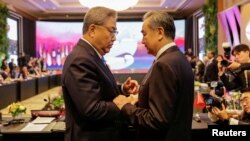Experts say South Korea can be expected to follow up on fence-mending talks with China initiated at last week’s ASEAN summit in Jakarta, but few expect a significant reduction in the diplomatic and strategic pressures that are driving them apart.
The renewed diplomatic engagement was aimed at easing bilateral tensions prompted by Beijing's dissatisfaction over Seoul's tightening ties with Washington. Their talks also came amid Washington's diplomatic overtures to Beijing aimed at managing risks in their competition.
South Korean Foreign Minister Park Jin and Wang Yi, the head of Chinese Communist Party's Central Commission for Foreign Affairs, met on the sidelines of the ASEAN regional forum in Jakarta last Friday.
In a 45-minute meeting, the two "agreed on the importance of high-level exchanges" and "decided to promote bilateral exchanges and communications at various levels," said a statement released Tuesday by the South Korean Foreign Ministry.
Their meeting came after Xing Haiming, Chinese ambassador to South Korea, warned Seoul against placing a "wrong bet" in Sino-U.S. rivalry and urging Seoul to stop "decoupling" from China.
Analysts said Seoul's effort to reset its relations with China might be difficult as long as Beijing supports Pyongyang.
"Although the Republic of Korea has made a 'strategic tilt' away from its previous relationship with the PRC, Seoul continues to have an interest in maintaining proper, balanced relations with China," said Evans Revere, a former State Department official with extensive experience negotiating with North Korea.
"Towards that end, I expect the ROK will continue to seek good ties with Beijing, even as South Korea pursues closer, stronger and more cooperative ties with those countries with which it shares interests and values including the United States, Japan, Australia, and the member countries of the EU and NATO."
South Korea's official name is the Republic of Korea (ROK). China uses the People's Republic of China (PRC) as its official name.
VOA's Korean Service contacted the Chinese Embassy in Washington for comments on the Park-Wang meeting in Jakarta and was referred to an article in the Beijing-affiliated Global Times.
The article reported last Saturday that Wang suggested to Park at the meeting that the two sides should "restart exchanges at all levels" and that Seoul "should not be influenced by third parties."
Seoul has been moving closer to Washington and other Western countries in recent months.
South Korean President Yoon Suk Yeol in May held a series of bilateral meetings with several leaders at the G-7 summit in Hiroshima. At the meeting, the seven wealthiest countries announced they would take unified steps to de-risk their economies away from China, which they consider to be engaged in "malign practices."
Joseph DeTrani, the special envoy for the six-party denuclearization talks with North Korea during the George W. Bush administration, said China wants to improve its relations with South Korea because it realizes driving a wedge between Seoul and Washington is difficult as "the Yoon administration is determined to work with the U.S. on extended deterrence and enhanced joint military exercises."
South Korea and the U.S. began holding their first Nuclear Consultative Group meeting in Seoul on Tuesday to discuss joint nuclear responses against North Korea's missile and nuclear threats — a policy known as “extended deterrence.” The establishment of the joint nuclear body was announced during Yoon's state visit to Washington in April.
The U.S. and South Korea held trilateral missile defense exercises with Japan on Sunday.
The joint drills followed North Korea's launch of a Hwasong-18 intercontinental ballistic missile (ICBM) on July 12.
The U.S. sent a nuclear ballistic submarine to South Korea as a show of force on Tuesday.
On Wednesday local time, North Korea test fired two ballistic missiles, according to South Korea's and Japan’s militaries.
At a U.N. Security Council meeting held last week to discuss North Korea's latest ICBM launch, China supported Pyongyang's long-held position on conducting missile tests. Beijing said North Korea is threatened by U.S.-South Korea military exercises.
Robert Rapson, who served as charge d'affaires and deputy chief of mission at the U.S. Embassy in Seoul from 2018-2019, said it would be good if Seoul and Beijing held regular talks after their Jakarta meeting.
However, he said he remains skeptical whether they would take "follow-up actions" to "achieve what both sides claim they want," which is to "reset [their] bilateral relations to a more positive trajectory."
